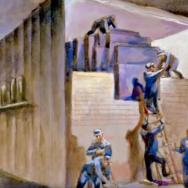Following a three-day conference at the University of Chicago, on July 16 a group including 13 Nobel laureates and 40 nuclear experts issued an urgent appeal to world leaders: Return to diplomacy now to stave off nuclear war.
Their official Declaration, a document that centered on 13 calls to action, marked the culmination of the Nobel Laureate Assembly for the Prevention of Nuclear War. The event was organized by a group of laureates, the Bulletin of Atomic Scientists, UChicago’s Existential Risk Laboratory, and the Pugwash Conferences on Science and World Affairs.
“We do not deny that the fear of nuclear war has played a role in preserving some stability among nations, but a global security structure forever dependent on fear is ultimately a reckless gamble,” the laureates and nuclear experts wrote in the Declaration. “Without clear and sustained efforts from world leaders to prevent nuclear war, there can be no doubt that our luck will finally run out.”
Concluding on the 80th anniversary of the Trinity test—the 1945 detonation of the world’s first nuclear bomb over the New Mexican desert—the conference was the first Nobel Assembly focused on nuclear threats. The event featured panel discussions and presentations from experts, as well as the drafting of the recommendations. It concluded with the release of the Declaration as well as a public concert from the Grammy-Award-winning Kronos Quartet that wove music with stories of nuclear near-misses through history.
Organizers said the timing of the conference, planned since last year, comes at what they fear is the “beginning of a new, complex, and dangerous nuclear arms race” on an increasingly chaotic global stage.
The laureates and experts’ declaration focuses on reinvigorating diplomacy while exploring new solutions for nonproliferation. It urges every nuclear state to recommit to the Comprehensive Nuclear-Test-Ban Treaty (CTBT) and Nuclear Non-Proliferation Treaty, update the Outer Space Treaty, and explore new avenues to work toward the ultimate goal of eliminating nuclear weapon stockpiles.
The assembly also highlighted the role in the nuclear landscape of emerging technological challenges and benefits, especially those presented by the rapid growth of AI. The members called for stronger verification of possible nuclear tests via satellite- and AI-assisted monitoring; human control over any AI-linked decision chain relating to the use of nuclear weapons; and restraint on missile-defense programs, which they described as intrinsically linked to offensive weapons.
Finally, the declaration also urges fresh research into nuclear war’s humanitarian and environmental toll and calls for the enlistment of scientists, civil society and faith-based groups to pressure leaders into lowering the nuclear threat.
“One throughline is that right now we’re fragmented—every nation is going alone, and this is an extraordinarily dangerous development,” said UChicago Prof. Daniel Holz, the founding director of the Existential Risk Laboratory, chair of the Science and Security Board of the Bulletin, and a member of the assembly’s organizing committee.
“Even in the depths of the Cold War, the U.S. and the Soviet Union were in touch, with their militaries and scientists exchanging information, and the establishment of systems such as the ‘red phone.’ This was critical to building trust and avoiding nuclear war due to mistakes or miscommunications. In the nuclear age, it is critical for countries to talk even when they don’t get along. The lives of all human beings on the planet depend on it.”
The setting of the assembly bears historical significance. UChicago was the site of the first self-sustaining nuclear chain reaction, achieved on Dec. 2, 1942 by Enrico Fermi and Manhattan Project scientists from around the world. This was a crucial step toward proving the concept of a nuclear weapon.
A group of scientists from that effort who were deeply concerned about the risks to civilization from nuclear weapons later formed the Bulletin, based at UChicago. That organization now sets the Doomsday Clock each year as a metaphor for how close humanity is to destruction.
For the press event’s keynote address, Robert Floyd, executive secretary of the CTBT Organization, took the audience through a history of the nuclear era using references to the Greek myths of Prometheus, Pandora and Icarus—all characters who pushed limits and met extraordinary consequences.
In a similar vein, he described the Trinity test as “an astonishing feat.”
“It broke through the limits of science and opened the way to the huge benefits of peaceful uses of nuclear technology—but it created new and existential questions at the limits of science, at the limits of policy-making and diplomacy,” Floyd said.
“Eighty years from now, will that year’s assembly of Nobel laureates be celebrating 160 years of avoiding nuclear war? Or will they be cursing us … for stealing fire from the gods, for opening the box, for flying far too close to the sun?”
Though most of the three-day conference was held behind closed doors, attendees at Wednesday’s public event witnessed the formal signing of the Declaration and heard from a series of speakers.
These included a video address from Masako Wada, from Nihon Hidankyo—a Japanese Nobel Prize-winning organization founded by survivors of the 1945 atomic bombings of Hiroshima and Nagasaki and dedicated to abolishing nuclear weapons—and remarks from Cardinal Silvano Maria Tomasi, an adviser to Pope Leo XIV on nuclear issues.
At various points of the public event, the Nobel laureates and nuclear experts looked back at the Manhattan Project physicists, whose work brought the bomb into existence. However, their Declaration’s closing draws from the sentiments of two leading scholars who did not contribute to that effort.
“There is no greater obligation than to prevent the catastrophe of nuclear war,” the statement read. “These actionable and attainable steps will aid global leaders in this solemn task. We ask that they each be guided by the words of Nobel Laureates Bertrand Russell and Albert Einstein: ‘We appeal as human beings to human beings: Remember your humanity, and forget the rest.’”

